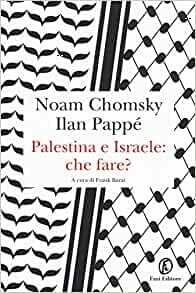Take a photo of a barcode or cover
dark
emotional
informative
reflective
sad
medium-paced
This collection of essays and recorded conversations is incredibly interesting and thought provoking.
I found the writing engaging and very easy to follow. I did find myself having to search for further information elsewhere to fully understand what was being talked/written about.
The first half of the book was probably the best with a great introduction by Ilan, and the recorded conversations (which were my favourite part of the book).
The second half felt a bit tacked on with essays which repeated topics already explored several times.
Overall a good and engaging book.
I found the writing engaging and very easy to follow. I did find myself having to search for further information elsewhere to fully understand what was being talked/written about.
The first half of the book was probably the best with a great introduction by Ilan, and the recorded conversations (which were my favourite part of the book).
The second half felt a bit tacked on with essays which repeated topics already explored several times.
Overall a good and engaging book.
Graphic: Genocide, Xenophobia, Colonisation, War
Moderate: Racism
What I liked:
✔️I appreciate the importance of the knowledge shared by the authors
✔️Chapters written like articles. Broken down into different topics
✔️I preferred reading Chomsky’s versus Pappé’s written pieces
What I didn’t like:
✖️Pretty pro-Palestine. So depending on your own opinions, bare in mind this is heading towards one side of the politics
✖️Very heavy language and grammar so it got confusing sometimes
✖️You will need prior knowledge of the conflict to understand and appreciate this text
✔️I appreciate the importance of the knowledge shared by the authors
✔️Chapters written like articles. Broken down into different topics
✔️I preferred reading Chomsky’s versus Pappé’s written pieces
What I didn’t like:
✖️Pretty pro-Palestine. So depending on your own opinions, bare in mind this is heading towards one side of the politics
✖️Very heavy language and grammar so it got confusing sometimes
✖️You will need prior knowledge of the conflict to understand and appreciate this text
informative
medium-paced
challenging
informative
reflective
medium-paced
A collection of essays, articles, and discussions by and between Professors Noam Chomsky and Ilan Pappé on the subject of Palestine and Israel. Indeed, it seems like it’s impossible to talk in detail about the former without also mentioning the latter – perhaps Frank Barat knew this and decided to save words in the title. If you’re looking for a historical overview of events, or even a record of recent events, I wouldn't recommend this book: it is not a primer on the history and present state of Palestine. Rather, it seems more helpful in explaining why conflict and suffering still persist, and what the path to reducing/eliminating them might look like.
I found the first essay – by Pappé – the most thought-provoking. In it, he discusses the semantics of the Israeli-Palestinian conflict (including that term itself), how it shapes thinking and actions, and why it must change. He makes a clear distinction between the favoured Israeli/American/“Western” language of "two-state solutions", "negotiations", and the "Israeli-Palestinian conflict" on the one hand, and the language of the BDS (Boycott, Divestment, and Sanctions) movement, which increasingly pushes for the inclusion of Apartheid and Colonial (particularly settler colonialism) concepts to describe the Israeli-Palestinian relationship. Pappé also advocates for a shift from a paradigm of "tragedy" or "catastrophe" (Nakba) to one of "crime" and "ethnic cleansing" (which implies both a victim and a perpetrator). This essay best summarises the gist of the book, namely by defining the conceptual-semantic framework which holds the conflict together, and by offering a way to challenge it. If you could only read one chapter, it should be the first one.
Although it is not explicitly stated as such, this book is still very US-oriented. The “Present” chapter, for example, is almost entirely about academic boycotts in the US and their merits/disadvantages. This can be justified in the sense that the US is Israel's biggest international ally, and, in the opinion of Chomsky, the crucial actor in maintaining the status quo. Nevertheless, they do sometimes move suspiciously easily between the US and the “West”. The book can also be a bit samey; at least it was for me when I came across Chomsky’s sarcastic comment about the Palestinians voted “wrongly” in their free election in January 2006 for the fifth time. The sense of monotony is reinforced by the fact that both men are speaking from a similar background (both professors with Jewish heritage at “Western” universities), and the fact that they mostly agree with each other. I therefore appreciated that Chapter 5 addresses the two men directly, asking them about the roles their personal backgrounds and situations play in their experiences and perspectives.
Chapter 5 also includes some of the best questions and answers in the book. One quotation which struck me (personally) was Pappé’s response to the question of what it’s like being a history professor in the UK rather than Israel, to which he replied that he wouldn’t really want to be a professor anyway: "Universities are sites for careers now, not for knowledge and education" (131). I found this quite powerful, not least because it seems to undermine the very premise of the book, being a collection of thoughts of two university professors at non-Israeli universities. Another comment by Pappé a few pages later was equally striking to me. A common Western mentality, according to him, is the idea that "I can only advocate for what I can get, not what I want" (134) (in reference to the usefulness of advocating for a single-state solution). I think this is very true, and a great place to start challenging the Palestinian situation in the way Pappé describes himself in Chapter 1. I just wish they spent more time developing these two comments, rather than hiding them in the middle of the book.
It's funny. I bought this book whilst at school because we were learning about the Israeli-Palestinian conflict in History. I never read it. Now, reading it whilst Israelis and Palestinians are bombing each other in yet another flare-up of violence, the reading experience was that much more powerful. I finished it a day after the ceasefire was declared as well, which is surreal.
I found the first essay – by Pappé – the most thought-provoking. In it, he discusses the semantics of the Israeli-Palestinian conflict (including that term itself), how it shapes thinking and actions, and why it must change. He makes a clear distinction between the favoured Israeli/American/“Western” language of "two-state solutions", "negotiations", and the "Israeli-Palestinian conflict" on the one hand, and the language of the BDS (Boycott, Divestment, and Sanctions) movement, which increasingly pushes for the inclusion of Apartheid and Colonial (particularly settler colonialism) concepts to describe the Israeli-Palestinian relationship. Pappé also advocates for a shift from a paradigm of "tragedy" or "catastrophe" (Nakba) to one of "crime" and "ethnic cleansing" (which implies both a victim and a perpetrator). This essay best summarises the gist of the book, namely by defining the conceptual-semantic framework which holds the conflict together, and by offering a way to challenge it. If you could only read one chapter, it should be the first one.
Although it is not explicitly stated as such, this book is still very US-oriented. The “Present” chapter, for example, is almost entirely about academic boycotts in the US and their merits/disadvantages. This can be justified in the sense that the US is Israel's biggest international ally, and, in the opinion of Chomsky, the crucial actor in maintaining the status quo. Nevertheless, they do sometimes move suspiciously easily between the US and the “West”. The book can also be a bit samey; at least it was for me when I came across Chomsky’s sarcastic comment about the Palestinians voted “wrongly” in their free election in January 2006 for the fifth time. The sense of monotony is reinforced by the fact that both men are speaking from a similar background (both professors with Jewish heritage at “Western” universities), and the fact that they mostly agree with each other. I therefore appreciated that Chapter 5 addresses the two men directly, asking them about the roles their personal backgrounds and situations play in their experiences and perspectives.
Chapter 5 also includes some of the best questions and answers in the book. One quotation which struck me (personally) was Pappé’s response to the question of what it’s like being a history professor in the UK rather than Israel, to which he replied that he wouldn’t really want to be a professor anyway: "Universities are sites for careers now, not for knowledge and education" (131). I found this quite powerful, not least because it seems to undermine the very premise of the book, being a collection of thoughts of two university professors at non-Israeli universities. Another comment by Pappé a few pages later was equally striking to me. A common Western mentality, according to him, is the idea that "I can only advocate for what I can get, not what I want" (134) (in reference to the usefulness of advocating for a single-state solution). I think this is very true, and a great place to start challenging the Palestinian situation in the way Pappé describes himself in Chapter 1. I just wish they spent more time developing these two comments, rather than hiding them in the middle of the book.
It's funny. I bought this book whilst at school because we were learning about the Israeli-Palestinian conflict in History. I never read it. Now, reading it whilst Israelis and Palestinians are bombing each other in yet another flare-up of violence, the reading experience was that much more powerful. I finished it a day after the ceasefire was declared as well, which is surreal.
informative
inspiring
reflective
slow-paced
Loved the formatting of this book as a conversation between Chomsky and Pappé. A wonderful academically crafted intro to Palestine and their history with Israel - highly recommend!
challenging
hopeful
informative
inspiring
reflective
slow-paced
challenging
dark
informative
reflective
sad
fast-paced
informative
fast-paced






